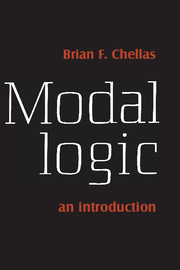2 - Logical preliminaries
Published online by Cambridge University Press: 05 June 2012
Summary
This chapter is an introduction to most of the concepts we shall use in studying modal logic.
In section 2.1 we set out most of the syntactic concepts. Section 2.2 introduces semantic concepts: the general idea of a model, truth conditions for non-modal sentences, and definitions of truth in a model and validity in a class of models. Filtrations of models are described in section 2.3. In section 2.4 the idea of a system of modal logic is explained, along with such relevant notions as theoremhood, deducibility, and consistency. Axiomatizability is discussed in section 2.5. Maximal sets of sentences and Lindenbaum's lemma occupy section 2.6. In section 2.7 we define determination and explain our approach, using canonical models, to proofs of determination. Finally in section 2.8 we outline our method of proving the decidability of systems of modal logic.
As the need arises the reader may wish to return to various sections of this chapter, for important definitions and theorems.
Syntax
This section is devoted to a recital of the basic syntactic concepts for the language of modal logic, many of which the reader has likely gleaned from chapter 1. The ideas are very simple. The few formal definitions we offer may be helpful, but they are not essential; we state them mainly for the sake of completeness and future reference.
Information
- Type
- Chapter
- Information
- Modal LogicAn Introduction, pp. 25 - 64Publisher: Cambridge University PressPrint publication year: 1980
